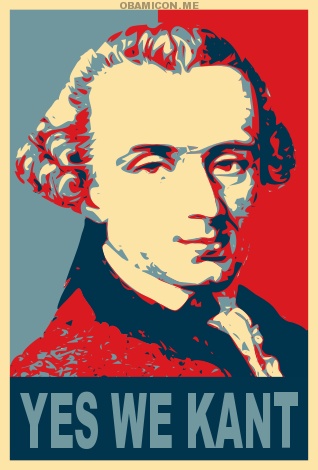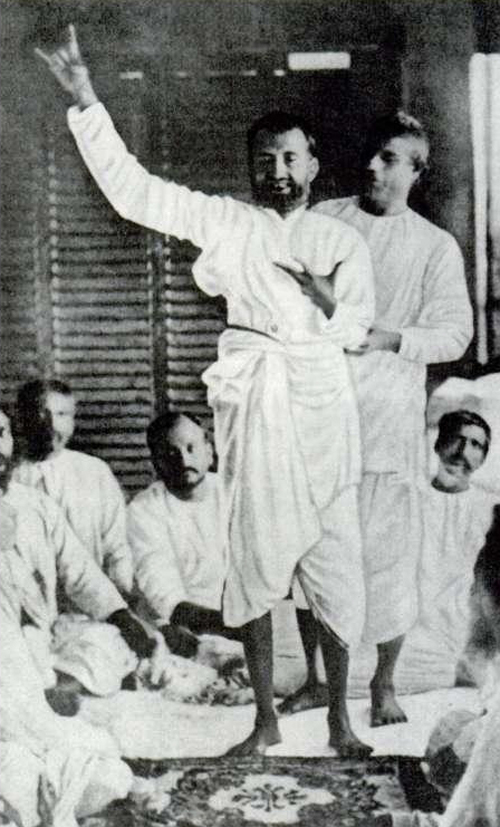— Botched Enlightenment: A Conversation

Bhrigupati Singh: Leela, I want to discuss a recent event with you because I'm not sure of the horizon from which to consider its significance. The event occurs in your recent book The Common Cause. Like your earlier work, this book makes a world map. Strange figures appear on this map: loinclothed Indian “gymnosophists” in conversation with Greek Cynics, gurus beside minor mutineers. But one doesn’t have to be frugal or rebellious to do philosophy. Kant, as you describe him, becomes quite cozy, even charming—a dapper dinner party host. But in these dressings and undressings, an event occurs. You take the scare quotes off Enlightenment. Are we now less scared of this word? Or maybe it’s not a matter of removing the marks. You color it differently. Enlightenment. How strange this word now looks! And how moving that devotees of reason consented to retain this stubbornly spiritual word as a term for their modern aspirations. This baring or recoloring of Enlightenment, your deduction of quotes, may not have been an event if someone else had executed it. You are said to be a postcolonial theorist, and for postcolonials it is often assumed that the only permissible attitude to the term Enlightenment is one of skepticism. Does The Common Cause betray its cause?
Leela Gandhi: The involvement of postcolonial thought in the critique of the Enlightenment makes for interesting intellectual history, doesn’t it? The critique is arguably as old as the Enlightenment, with Hegel among the first to accuse his predecessors of lifeless abstraction in their philosophy. It’s amusing to recall Hegel’s bristling allegation that the Kantian categorical imperative (testing the ethical heft of an action in advance of the action itself) is like “not wanting to go into the water before we have learnt to swim.”
This negative appraisal undergoes mutations in its travels over the next two centuries. But it’s always posited as strictly internal to Western philosophy. What else is the post-Enlightenment dialectic but a formula in which, Marx once said, everything is already “pregnant with its contrary”? By the time Karl Löwith (one of Heidegger’s less famous disciples) joins the conversation, the attitude has become xenophobic. Western thought can heal itself by itself, Löwith says. It has its own antibodies. There’s certainly no need to turn to the alien example of the East.
In this context, the (belated) postcolonial critique of the Enlightenment has the quality of breaking into a house or gate-crashing a party. There’s something historically daring and delightful in the stance of uninvited interpolation, and the radical forms of hospitality it calls forth. But yes, like many others in the field, I’m not attached to showing what a miserable failure the Enlightenment was—out of deference to a hidden strand of anticolonial thought.
In the first half of the twentieth century there was tremendous anger, of course, over the vicious totalitarianisms of the era, fascism and new imperialism included. But even the angriest of anticolonial thinkers (Gandhi and Fanon, for example) had real regard for the immaterial goods of the West. So they crafted a reverse civilizing mission to save Europe from its worst self. The spirit and soul of democracy was considered the most precious legacy of the Enlightenment. I wanted to examine this moment when, in the most antagonistic historical milieu, adversaries combined to salvage the inner life of democracy. What would such democratic interiority even look like?
So I placed the eighteenth-century revolutions and bills of rights and the decolonization revolutions and postcolonial constitutions of the twentieth century in a single analytic frame, as shared history. For the first time I saw secreted in the work of the most iconic Enlightenment thinkers—Kant, Rousseau, Bentham, and Hume—the beautiful idea that true democracy is not just an institution. It is also a spiritual exercise or askesis of forfeiture. Well before we consider the political structures for democracy we must learn to level out our discrepant natural advantages for the common cause. It turns out that self-limitation is the ethical groundwork of the Enlightenment.

The real surprise is how much the liberal-Romantics and anti-Enlightenment thinkers of the late eighteenth and nineteenth centuries, to whom we habitually turn for current conceptions of the political, hated this ethical-democratic project. John Stuart Mill decried it as a “law of descent [that] constantly levels men to a common point.” The reactionary desire for an enclave of excellence, rank, and exceptionality within democracy resulted in a shared ethos of perfectionism across the new imperialisms, fascisms, and new liberalisms of the era. In this setting, an unexpected ballast for the spirit of democracy—and an objection to the epochal perfectionist style of twentieth-century totalitarianism—grew out of the anticolonial mission civilisatrice that I mentioned earlier, with its desire to salvage the very best of Europe. Its signatory ethical style was moral imperfectionism or self-ruination: becoming less rather than more.
So, to return to your wonderful opening provocation: moral imperfectionism, or the ethical and political project of botching one’s own perfection for the sake of democracy, is the unexpected way in which anti- or postcolonial thought enters into creative solidarity with the Enlightenment. The scare quotes can come off, and maybe we can still leave our thinking hats on.
Bhrigu: So maybe let’s call your world map a plot of transnational askesis. We usually follow maps of trade and conquest, so it takes a while to measure this plot. If I’ve followed it correctly, then your sense of asceticism and self-limitation is not about world negation or penitence or salvation, but a way of affirming life in this world. In light of this world, let me ask you a question Pierre Hadot asked Foucault. He didn’t really ask Foucault, but criticized him in Philosophy as a Way of Life for reducing askesis to dandyism by subtracting the transcendental, cosmic element from ancient Greek spiritual exercises. Such exercises needn’t only be ancient or Greek, they are also part of the modern European Enlightenment. For instance, consider this proposition from one of my favorite texts, a brief essay by Claude Lévi-Strauss called “Jean-Jacques Rousseau, Founder of the Sciences of Man.” Lévi-Strauss highlights a passage from the second walk of Rousseau’s Les Rêveries:
We know of a minute in the life of Rousseau—a second, perhaps—whose significance in his eyes, in spite of its tenuousness, orders all the rest. It explains why at the end of his life it is that moment which obsesses him, which he lingers to describe in his last work, and to which in his random walks, he comes back constantly. What is it though, but a commonplace recovery of consciousness after a fall and a fainting spell? But the feeling of existing is “precious” beyond all others, undoubtedly because it is so rare and so debatable. “I felt as if I was filling with my light existence all the objects which I perceived … I had no distinct notion of my person … I felt in my whole being a ravishing calm to which, every time I recall it, I find nothing comparable in the whole experience of known pleasures.1 Claude Levi-Strauss, Structural Anthropology vol. 2, trans. Monique Layton (Chicago: University of Chicago Press, 1983), 42.
Is this moment too Romantic? When did Romantic become discolored by scare quotes, a disqualification one must avoid to be taken seriously?
But let’s stay with our own thoughts. Daringly, you ask us to consider not just institutional and procedural manifestations but the inner life of democracy. How far outward does our inner life reach? I know metaphysics is a heavy word, but let’s use it for a moment to describe a sense of existence that exceeds the immediately observable physical world. In moving between your own minute and Rousseau’s, we might ask: What relationship does your vision of the inner life of democracy have to a metaphysical sense of enlightenment?
Leela: Fabulous, yes: the problem of godless askesis or anti-spiritual spiritual exercises. I’ll attempt a provisional response to this crucial challenge.
For all the historical and cultural diversity in the metaphysical traditions available to us (Unity in Advaita, Forms in Plato, Nihil in Buddhism, Finality in Aristotle), there’s a consensus that metaphysics is minimally about going beyond the sensible or physical realm (phusikia). Let’s think of these traditions combining across the twentieth century in an updated colloquium on spirit for the time of democracy. What changes here?
Suddenly, we find a chorus against metaphysical elitism and the demotion of phusikia, and an accent on the reenchantment of matter and the senses. Henri Bergson is a key ambassador for the new democratic dispensation. As he says in his 1903 essay “An Introduction to Metaphysics,” matter already exceeds itself within time. The changes and transformations of ordinary existence—older, taller, thicker, happier, seasonality, scar tissue—are intrinsically metaphysical. The art is treating these temporal metamorphoses with sacred regard and admitting them to our most refined consciousness.
Bergson also exposes the transnational circuitry of democratic metaphysics. The Chinese thinkers Liang Qichao and Zhang Junmai studied with Bergson and invited him to China along with Tagore for a symposium on civilizational futures. Wildon Carr’s rendition of Bergson’s 1911 lectures on “The Perception of Change” made it into the personal library of the Indian mystic and philosopher Sri Aurobindo. Aurobindo and other gurus of modern antinomian South Asian mysticism in turn show how democratic spiritual practice is a sadhana, or a practice of descent: falling for, rather than flying from, the world.
In 1864 the guru Sri Ramakrishna Paramahamsa had mastered techniques for total liberation from empirical existence. However, as soon as he was on his way to the greatest spiritual heights, he turned back toward the world and descended. Years later at the master’s deathbed his favorite disciple, Naren (or, Swami Vivekananda), translated this event thus: “Great souls, even after their own liberation, retain the ego and experience the pleasure and pain of the body that they may help others to attain liberation. It is like coolie work.”2 Mahendranath Gupta, The Gospel of Sri Ramakrishna, trans. Swami Nikhilananda (New York: Ramakrishna-Vivekananda Center, 1942). See → The example of Mahayana Buddhism was on the minds of Ramakrishna and Naren at the time, especially the new emphasis on achieving enlightenment (bodhichitta) not just for oneself but for everybody. The updated figure of the bodhisattva—every bit the mystic-coolie and icon for democratic metaphysics—defers (botches) her own liberation until all are in light.

And when everyone is bodhisattva, what then? All of us gathering in the waiting room of light, saying pehle aap, pehle aap? This would be ethics as “you first” philosophy! I’ll vary Bergson slightly: “[We] will have contemplated [ourselves] in a mirror which reflects an image … much shrunken, no doubt, but for that reason very luminous.”
Bhrigu: Poised in this waiting room, rather than being like insistent moths, can we challenge the primacy of light itself? Or maybe it might be more fruitful to ask: What is our picture of luminosity, our image of light in the Enlightenment? Is it the constant sun or the blemished moon? And further: Do we tend only towards or away from the light? Let me give you an example of a spiritual adept who might be misinterpreted as being an advocate for the preservation of rank, aristocracy, ascent in democracy; someone who holds the “herd instinct,” the clanging and banging of nationalism (the form in which we most often encounter democracy), in sheer contempt: Nietzsche.
But consider Nietzsche in a different light, in relation to a current event, although for many it may be old news: Thus Spoke Zarathustra as a reversal of Platonism. Plato is many things, but at its heart Platonism is an ascent, from the cave of shadows to the form of the good, the sun. In contrast, Zarathustra begins with a change of heart and direction, in a gesture of turning-away-from that is also a turning-towards—and a form of descent that Ramakrishna might be sympathetic to, or not. In the first lines of the book, facing the sun, Zarathustra says he is weary not of the world, but of the pursuit of light and wisdom, which grows overripe unless it is distributed. “Therefore must I descend into the deep: as thou doest in the evening …”3 Friedrich Nietzsche, Thus Spake Zarathustra, trans. Thomas Common (Germany: 1891).Thus begins Zarathustra’s way down.
So Nietzsche wants us to think about descent, which is as hard, or maybe harder, than ascent. But here is the puzzle he leaves us with, what we might call the bipolarity of ascent and descent. Alice grows bigger as she grows smaller. Every undergoing is also an overcoming:
Man is beast and super-beast … these belong together. With every increase of greatness and height in man, there is also an increase in depth and terribleness: one ought not to desire one without the other—or rather: the more radically one desires the one, the more radically one achieves precisely the other.4 Friedrich Nietzsche, “Dionysus,” in The Will to Power, trans. W. Kaufmann and R. J. Hollingdale (New York: Vintage Books, 1968), 531.
With ascent, many were forthcoming with limitations. The human is neither god nor beast, they said. But can we desire to become animal, to become imperceptible? So with your emphasis on descent, let me ask you this: How deep can we descend? And as with Zarathustra, doesn’t the possibility of descent arise only after it has been preceded by an ascent (which need not only be eugenics, or perfection, or a monstrosity of ascent, it may also be an ordinary askesis, a pursuit of wisdom)? And, if so, why privilege the latter over the former? Or, rather than speaking of latters and formers, let’s say that “one ought not to desire one without the other”? Or maybe it is a question of finding new habits of thought. After roughly two millennia or more of an emphasis on ascent and salvation and progress, is it part of our current situation to think again, to orient ourselves towards descent? A descent towards what?
Leela: It’s such a pity we don’t have the space to play with this beautiful matter of light in botched Enlightenment. But the blemished moon—presiding deity of your own recent book, Poverty and the Quest for Life—is a wonderful placeholder. In this book you write eloquently of everyday ascent in desperate circumstances (the pursuit of wisdom, happiness) as an existential imperative. Had we more time we might have canvassed variations on “rising above,” such as “standing beside,” “getting behind,” or “slipping away.” Foucault helps in his famous essay on the Kantian Enlightenment when he declares the Aufklärung to be neither light nor transcendence but in fact an exit.

To turn to the question of Nietzsche, a crucial prompt to the postmetaphysics we are tracking. He is prescient about the inextricability of ascent-descent. Ascent is, of course, the sine qua non of descent, as perfection is of imperfection. I’ve often thought of Icarus as the poetic figure for the ascent-descent doublet, who shows us how the proper measure of falling is precisely a capacity for or proximity to height or light (such as it is).
Apropos Nietzsche, and the accent on what you term the “bipolarity” of rising-falling, ascent-descent, perfection-imperfection, I have one further grammatical addendum. Within orthodox metaphysics (the theology of ascent) we are often told to distill the discrete law of our nature—swadharma, in one tradition—by defying the normative, leveling constraints of everyday life: job, anxieties, desires, peers, fashions, and so on. Once we’ve gotten there though—all crystalline, fully formed and already preterit—the heterodox imperfectionist metaphysics (of descent) ask us to walk away. This sort of secondary imperfection is not strictly antonymic, not the polar opposite of perfection, perfectability, greatness, and height. In the additional sense of the imperfect verb form it now means leaving something unfinished, so as to keep our actions ongoing, uncompleted, hospitable, and aspirational.
So what’s the point of this variant? We no longer have the recourse of our faraway ancestors to a reliable or shared eschatology. This may be it. We scarcely doubt our finitude. The trick is keeping the metaphysical imagination active and historically responsive to changing times (and in the context of our conversation, this is the time of democracy). Being unfinished, and thinking of ourselves as a work in progress, may well be the apt historical form of metaphysics after the decline of heaven. We are botched, therefore we are potential.
×


